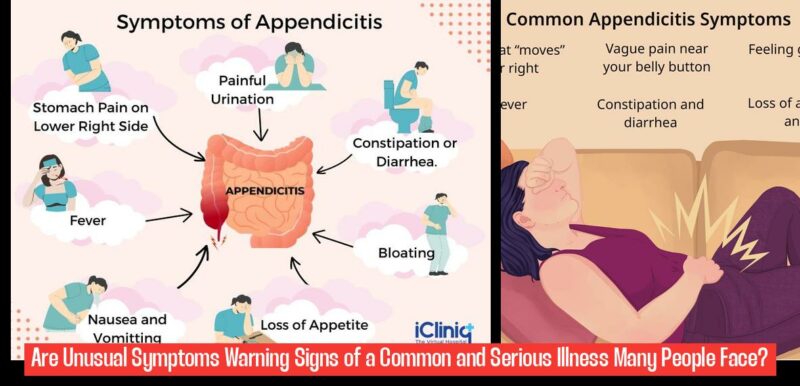Strange Symptoms Could Be a Red Flag of Illness Many People Suffer From
Imagine this: a seemingly harmless ache in your abdomen, a little bit of nausea, perhaps some constipation. Could these be just a passing inconvenience, or are they whispering a more serious story? The truth is, sometimes those unusual symptoms can be a sign of a condition that affects many people: appendicitis.
Appendicitis, the inflammation of the appendix, a small, finger-shaped pouch in your digestive system, can be a serious medical emergency. It starts with what feels like a regular stomach ache, but it can quickly escalate into a life-threatening situation if left untreated. This is why it’s vital to be aware of the red flags and seek medical help immediately if you suspect something is amiss.
The Subtle Clues: Recognizing Appendicitis Beyond the Obvious
While most people associate appendicitis with sharp, localized pain in the lower right abdomen, the reality is that its symptoms can be more nuanced and sometimes even misleading.
Think back to that initial stomach ache. While many people experience a sudden, intense pain in the lower right side, others might notice a more gradual pain that starts in the middle of their abdomen and then migrates to the lower right side. This can make it tricky to pinpoint the exact cause, especially since the pain can be intermittent at first.
Furthermore, appendicitis isn’t always about pain. Loss of appetite is another early warning sign. It can come before the pain, making it even more difficult to recognize.
It’s not just about the stomach either. Appendicitis can manifest as back pain, groin pain, or even discomfort in the rectum. These atypical symptoms can be even more confusing, leading people to dismiss them as unrelated issues.
Discover – Jeremy Renner Recounts Terrifying Accident in Tahoe that Caused His Eye to Come Loose
The Importance of Early Detection
The reason why appendicitis can be so dangerous is that it can quickly progress from a mild discomfort to a potentially fatal situation. If the inflamed appendix ruptures, it can release bacteria into the abdominal cavity, leading to a life-threatening infection known as peritonitis.
This is why early detection is crucial. If you experience any of the following, it’s essential to seek medical attention immediately:
- Abdominal pain that gradually worsens, especially if it’s located in the lower right side.
- Loss of appetite.
- Nausea and vomiting.
- Constipation or diarrhoea.
- Fever and a flushed face.
- Pain that worsens with movement, like bending over, sneezing, or coughing.
Don’t Ignore the Red Flags
Appendicitis can be confused with other conditions, such as gastroenteritis, irritable bowel syndrome (IBS), constipation, bladder infections, Crohn’s disease, and pelvic infections. This is why it’s critical to consult a healthcare professional who can properly diagnose the cause of your symptoms.
Appendicitis is a common condition, affecting around nine per cent of men and seven per cent of women in their lifetime. Don’t let the subtle, sometimes deceptive symptoms fool you. Listen to your body, pay attention to any unusual changes, and consult a doctor if you have any concerns. It could save your life.
A Case Study: John’s Story
John, a 35-year-old software engineer, thought he was just experiencing a bad case of indigestion. He had a dull ache in his stomach, felt nauseous, and had some mild constipation. He chalked it up to overeating and stress, and tried to ignore it.
However, the pain gradually worsened over the next few hours, and started to shift to the lower right side. He also noticed he had no appetite and felt increasingly feverish. John realized something was wrong and finally went to the emergency room.
Thankfully, John’s doctors recognized the signs of appendicitis and immediately performed surgery. If he had waited any longer, his appendix could have ruptured, leading to a life-threatening infection. John’s experience highlights the importance of seeking medical help promptly, even if you’re not sure what’s wrong.
What to Do If You Suspect Appendicitis
If you experience any of the symptoms mentioned above, it is crucial to seek immediate medical attention. Do not try to self-treat or wait for the symptoms to subside. Here’s what you should do:
>> Exploring the Legacy of EC Comics: A Preview of July’s Comic Releases
- Contact your doctor or a local out-of-hours service. If these options are not available, call NHS 111 for advice.
- Describe your symptoms in detail. Be honest and specific about your pain, its location, and how it’s changing.
- Avoid any strenuous activity. Rest and try to stay hydrated.
- Do not take any over-the-counter pain medications. These can mask the symptoms and delay diagnosis.
- Follow the instructions given by your doctor. They may recommend further tests, such as a CT scan or ultrasound, to confirm the diagnosis.
Appendicitis: A Common Yet Serious Condition
Appendicitis is a reminder that our bodies are complex, and even seemingly minor symptoms can be a sign of a serious underlying condition. Don’t underestimate the power of listening to your body and seeking prompt medical attention. Your health is worth it.
What are some common symptoms of appendicitis?
Common symptoms of appendicitis include abdominal pain, loss of appetite, back pain, groin pain, and discomfort in the rectum.
Why is early detection of appendicitis important?
Early detection of appendicitis is crucial because it can quickly progress from mild discomfort to a potentially fatal situation if left untreated, leading to complications like a ruptured appendix and peritonitis.
How can appendicitis symptoms be misleading?
Appendicitis symptoms can be misleading because they are not always the typical sharp, localized pain in the lower right abdomen. Some individuals may experience gradual pain starting in the middle of the abdomen or symptoms like loss of appetite, back pain, groin pain, or rectal discomfort.
When should one seek medical attention for suspected appendicitis?
If you experience symptoms such as abdominal pain that gradually worsens, loss of appetite, back pain, groin pain, or rectal discomfort, it is essential to seek medical attention immediately to rule out appendicitis.


